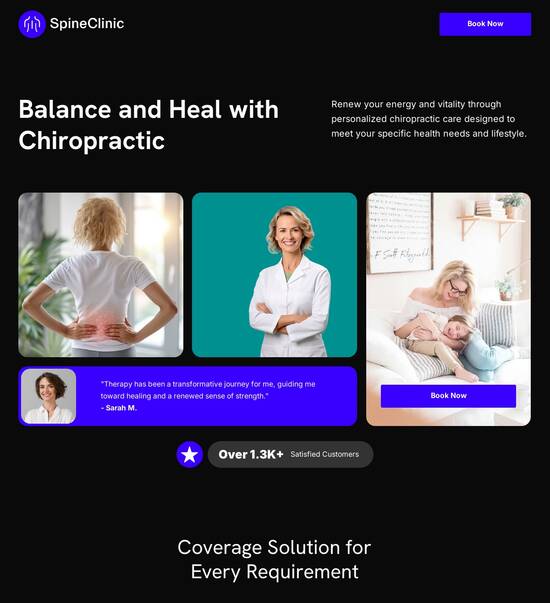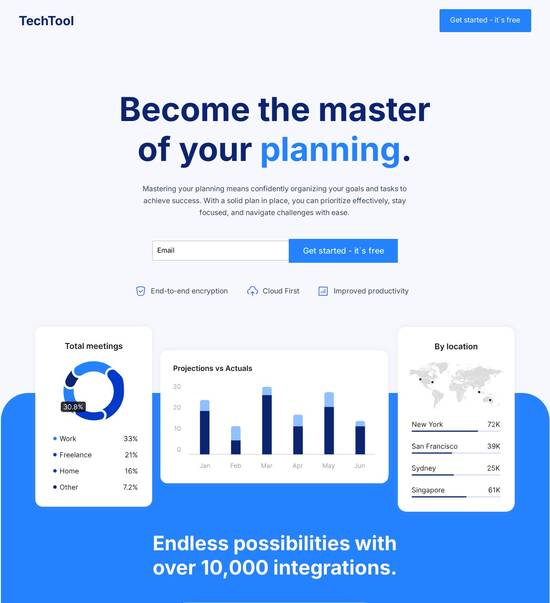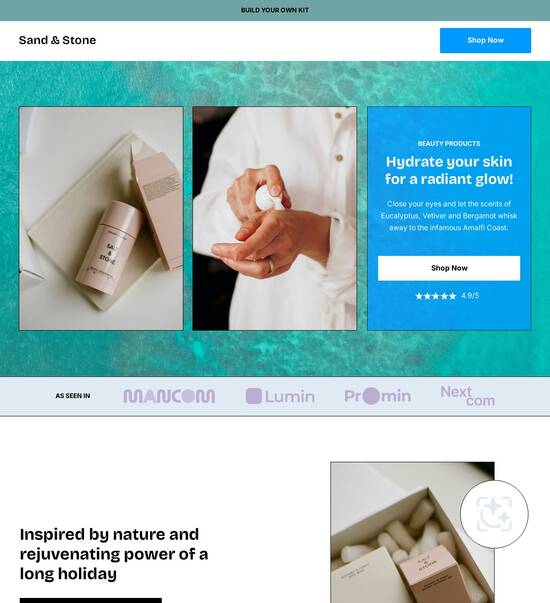
PHP optimized language learning website template
Explore Similar TemplatesAbout template
Leverage our intuitive page builder and high-converting PHP optimized language learning website template.
Recommended templates

Easy to build without coding
With the intuitive drag-and-drop builder, anyone on your team can create high-converting pages without any knowledge of code or design. Make enhancements to your landing page with custom widgets using Javascript, HTML/CSS, or third-party scripts.

Multiple layouts for any industry and goal
Select from 500+ landing page layouts built to boost conversions across industry-specific scenarios. Customize them by adjusting fonts, adding images, and generating on-brand content with the AI assistant. Quickly scale with Instablocks® and Global Blocks that you can save, reuse, and update globally.

Loads fast and looks polished on any device
Every template is responsive, which means they present professionally on any device and load blazingly fast with our Thor Render Engine. You can also power them up with Google AMP technology to deliver an unparalleled mobile experience and drive higher conversions.

Robust analytics & experimentation
Get real-time updates and reporting across all your devices, showing the number of visitors, conversions, cost-per-visitor, and cost-per-lead. Launch AI-powered experiments, run A/B tests, and use heatmaps to analyze user behavior, then optimize your landing page to maximize conversions.







Easy to build without coding
With the intuitive drag-and-drop builder, anyone on your team can create high-converting pages without any knowledge of code or design. Make enhancements to your landing page with custom widgets using Javascript, HTML/CSS, or third-party scripts.
Multiple layouts for any industry and goal
Select from 500+ landing page layouts built to boost conversions across industry-specific scenarios. Customize them by adjusting fonts, adding images, and generating on-brand content with the AI assistant. Quickly scale with Instablocks® and Global Blocks that you can save, reuse, and update globally.
Loads fast and looks polished on any device
Every template is responsive, which means they present professionally on any device and load blazingly fast with our Thor Render Engine.
Robust analytics & experimentation
Get real-time updates and reporting across all your devices, showing the number of visitors, conversions, cost-per-visitor, and cost-per-lead. Launch AI-powered experiments, run A/B tests, and use heatmaps to analyze user behavior, then optimize your landing page to maximize conversions.
All the features you need to build lead-generating landing pages
Explore more featuresLearn how to build top-performing landing pages for any goal
FAQs
Leading the way in building high-performing landing pages





Create high-converting landing pages with Instapage
Creating effective landing pages is crucial for any marketing strategy, especially within competitive industries. Instapage offers a powerful platform tailored to enhance landing page optimization and drive conversions. By using its intuitive design tools, marketers can easily access over 100 templates, making the creation of high-performing campaigns accessible to everyone.
Understanding the importance of landing pages
Landing pages serve as the bridge between your online ads and conversion goals. They’re designed to drive visitors toward taking specified actions, such as signing up for a newsletter or making a purchase. With Instapage, you can leverage built-in optimization features to personalize content and improve user experience, driving better results.
- High conversion rates: Instapage allows you to customize landing pages that resonate with target audiences, resulting in improved conversion rates.
- Rapid testing capabilities: Use A/B testing to experiment with different creatives and campaigns to decipher what resonates.
- Collaboration integration: Streamline the feedback process with stakeholders and team members directly on the platform.
Step 1: Choose the right template
Selecting a suitable template can make a significant difference in your campaign’s success. Instapage provides a wide variety of adaptable templates designed for every industry. Consider choosing templates based on your target audience and the goal of your campaign.
Step 2: Implement personalization features
Personalizing content is essential to increasing engagement rates. With Instapage, you can use dynamic text replacement and AdMaps to ensure that your pages are audience-specific.
- Dynamic text replacement ensures that specific customer segments see tailored messages, increasing relevance.
- AdMaps align your ads with the corresponding landing pages, reaffirming the user’s journey.
- Personalized content maintains higher retention rates and encourages conversions.
Step 3: Analyze performance metrics
Once your landing pages are live, it's crucial to monitor their performance closely. Use Instapage's analytics dashboard and heatmaps to gather insights on user behavior and track how well your pages convert.
- Heatmaps visualize user interaction on your page, highlighting areas of interest or confusion.
- Analytics help track conversions, allowing for real-time adjustments based on user response.
- Utilizing A/B testing metrics can guide further refinements to your pages for optimal performance.
With these steps, you can leverage the full potential of Instapage for your landing page strategies, driving successful outcomes through careful planning and execution.
Ready to boost your marketing efforts? Start using Instapage today for stunning, conversion-optimized landing pages that propel your campaigns to success.
The Future of Language Learning: Harnessing PHP Optimized Website Templates
Understanding the core of PHP optimized language learning websites
PHP, which stands for Hypertext Preprocessor, is a widely-used server-side scripting language that has been a cornerstone of web development for decades. Its primary role is to generate dynamic web content and manage database interactions, making it an ideal choice for creating interactive language learning websites. One of the greatest advantages of PHP is its ability to integrate seamlessly with various databases, enabling the storage and retrieval of user data, such as progress tracking and personalized learning paths.
The demand for online education has surged, particularly in the realm of language acquisition. Language learning websites must not only provide lessons and materials but also engage users through interactive elements. Features like user forums, progress tracking systems, and multimedia content are crucial. This heightened expectation for functionality and interactivity means that the underlying design of these websites must be solid and capable of handling varied user demands.
Template engines: The backbone of dynamic websites
Template engines serve as the bridge between the logic of a web application and its visual layout. They allow developers to separate HTML and PHP logic, making it easier to manage and organize code. Popular PHP template engines include Twig and Smarty. These engines streamline the development process by providing syntax that simplifies the rendering of views and layouts.
The use of template engines enhances efficiency as they allow developers to focus on creating clean, maintainable code. By encouraging the separation of concerns between logic and presentation, template engines enable rapid development and are particularly beneficial in projects like language learning websites, where content updates happen frequently. For instance, a PHP-based education website can leverage a template engine to manage lesson templates effectively, allowing educators to make quick modifications or add new courses without delving deep into code.
Exploring template languages: Syntax and structure
Template languages provide a simplified syntax for web developers to create layouts in PHP. Understanding the nuances between various template engines is essential; for example, Smarty and Twig offer different approaches to structuring templates. Smarty utilizes a more traditional PHP-like syntax, while Twig employs a more streamlined, user-friendly syntax, which often leads to reduced complexity in code generation.
The clear syntax in these template languages lends itself well to language learning applications. For instance, displaying quizzes and exercises doesn't require extensive coding knowledge, allowing educators to implement features with ease. The importance of intuitive syntax cannot be understated; when developers can quickly grasp how to structure a template, they can focus on enhancing the user experience rather than troubleshooting confusing code.
Designing engaging and functional templates for users
An effective language learning template must incorporate various elements designed to enhance user engagement. Essential features include user dashboards that visually track learning progress, multimedia support for varying content forms, and interactive elements that encourage ongoing participation. Additionally, visual design plays a pivotal role; templates should be visually appealing while remaining intuitively navigable.
User dashboard: A personalized interface for tracking progress.
Multimedia support: Integration of videos, podcasts, and interactive exercises to meet diverse learning styles.
Responsive design: Ensuring usability across devices, from desktop to mobile.
Creating interactive templates is also crucial; including quizzes, flashcards, and forums fosters an engaging learning atmosphere. Therefore, it's essential to adhere to best practices in responsive design, ensuring users can access learning materials anytime, anywhere. This approach not only enhances the learning experience but also promotes retention and motivation, key factors in language acquisition.
The role of pre-built templates in accelerating development
Using pre-designed templates can significantly cut down development time, particularly in the context of language learning websites. Developers can take advantage of existing designs to build their sites quickly while using customizable features to meet specific requirements. These templates can come with a variety of layouts and components that support functionalities like user profiles and progress tracking without starting from scratch.
Time-saving: Developers can implement pre-built features rather than coding from the ground up.
Customization: Pre-built templates offer modules that can be adapted to align with unique educational goals.
Several high-quality language learning templates are available that showcase innovative features and modern design principles. These not only reflect the latest trends in web aesthetics but also prioritize the user experience, which is vital in maintaining learner engagement. Developers looking to create a compelling language learning platform can find various options equipped with essential functionalities, helping them to comprehensively address the learning needs of users.
Utilizing blocks for modular template development
Template blocks serve as the foundational building units in PHP templates. By employing blocks, developers can create reusable components that streamline the organization of a language learning website. For instance, a block dedicated to displaying video content can be reused across different lessons, ensuring consistency while reducing redundancy in code.
Reusable components: Building blocks allow for efficient content management.
Modularity: Blocks permit the easy addition of new features, such as exercises and community forums.
The effective organization and management of these templates directly impacts user experience. By structuring content types—such as exercises, videos, and discussion forums—into distinct blocks, developers can maintain a clean and organized layout that enhances navigation. This modular approach not only optimizes the development process but also aligns with best practices in user-centered design, ensuring learners can easily find and engage with content.
Navigating the sandbox environment for testing and development
A sandbox environment is crucial for developing and testing language learning websites. This isolated setting allows developers to experiment with code changes and new features without affecting the live site. Utilizing a sandbox ensures that developers can thoroughly test templates in various scenarios, maintaining the integrity of the user experience during development.
Real-world testing: Sandbox environments facilitate accurate testing of user interactions.
Iterative improvements: Developers can refine templates based on testing outcomes.
Incorporating user feedback is also vital in the template refinement process. By regularly gathering input from users, developers can make informed decisions that enhance usability and engagement. The combination of rigorous testing in the sandbox and ongoing feedback creates a continuous improvement cycle that ultimately benefits the learners, ensuring their experience is seamless and effective.
Full-featured language learning platforms: Beyond the basics
Building a full-featured language learning platform extends beyond basic lessons and quizzes. These websites should incorporate communities through forums, blogs, and user profiles that allow for social engagement among learners. Features like gamification encourage participation, making the learning process fun while promoting a sense of achievement.
Forums: They foster discussion and peer support among learners.
Progress tracking: Users can monitor their learning journey for better motivation.
Certification systems: They add credibility to the learning accomplishments.
Integrating these features can significantly enhance the platform's overall quality. By creating a comprehensive learning environment where users feel connected and supported, language acquisition becomes more effective and enjoyable. Developing these elements with a strong focus on user engagement ensures that learners stay motivated and invested in their language learning journey.
Peer comparison: PHP optimized templates vs. other programming languages
When comparing PHP with other programming languages like Python, Ruby, and JavaScript for template creation, PHP stands out due to its mature ecosystem and extensive community support. The PHP language is specifically designed for web development, making it a strong candidate for building dynamic applications like language learning websites. PHP's integration capabilities with various databases make it particularly suited to the needs of educational platforms, which often require real-time data exchange.
Moreover, the hosting flexibility associated with PHP can significantly reduce operational costs, which is a critical factor for education-focused developers. This cost efficiency doesn't compromise quality, as PHP provides robust performance alongside scalability, allowing language learning websites to grow in line with user demands.
Future trends in language learning website development
As the landscape of online education evolves, emerging technologies such as artificial intelligence are shaping the future of language learning. Personalized learning paths and adaptive learning systems tailored to individual user needs can dramatically improve the educational experience. Furthermore, mobile-first design has become crucial, as more learners access educational content on their smartphones.
PHP and innovations in template design are well-positioned to adapt to these trends. The flexibility of PHP allows developers to integrate sophisticated features like AI-driven lessons or enhanced user engagement tools. Predicting the evolution of PHP templates means acknowledging the growing need for intelligent content delivery that aligns with learners' specific goals and preferences.
Closing thoughts
Reflecting on the intricate components of the PHP optimized language learning website template brings forth a world of opportunities for developers, educators, and learners alike. Each section discussed reveals the transformative power of dedicated templates in enhancing the language acquisition journey, underscoring the importance of usability, engagement, and ongoing innovation within this evolving landscape.
Ready to skyrocket conversions?
Supercharge your ad campaigns with high-performing landing pages
Get started














